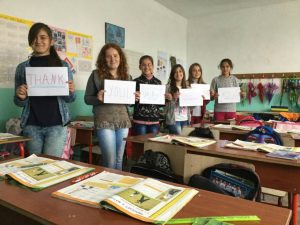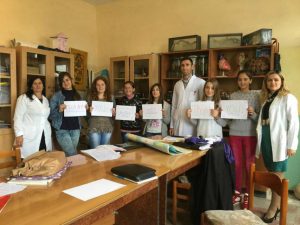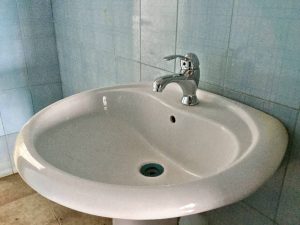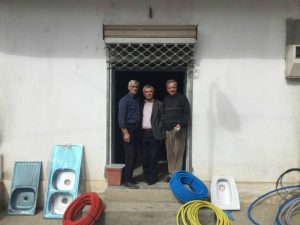This project has been completed under the direction of Peace Corps Volunteer Sho Tsubakiyama. To read about the beginning of the project, CLICK HERE.
Sho reports:
Scope of the Project
The goal of the project was to provide safer and better functioning restrooms for the students of Maqellare 9-year school. Previously, they had no toilet apparatuses at all and other bathroom amenities were rusted over and barely functional, if at all.In particular, these conditions did not accommodate for the female students who felt unsafe in these restrooms and did not have their basic hygiene needs met—an especially important concern during their menstruation periods. In response to these conditions, students (often female) would leave school to use the restroom, taking away from valuable learning time and, more importantly, presenting a significant safety concern. As the school psychologist Ronin said, “These bathrooms are unfit for students, but we are responsible for these students and should not let them leave the school. What can we do in this predicament?”
Therefore, we implemented this project in order to improve the educational experience of students, keep them in school, and, in particular, improve girls’ access to education.
Work that was done & how the work progressed
The project began in August of 2015 and was completed in December 2015. At the onset of the project, the school hired a new director, Gezim Qoku, who helped enormously with the implementation of the project. We began with a secondary evaluation of the water system to inform our implementation process. Once this took place, our plumber began working on the piping and water piping system, which did not function at all up to this point. Therefore, we created a water system that linked a nearby well to a water deposit that could bring water to the elementary school.After this, we installed toilets, faucets, and drains that would allow students to properly use the restrooms at school and wash their hands without having to leave school. Seeing that new doors were unnecessary, the school negotiated with World Vision to repair the existing doors and screen and contribute to the renovation of the school yard and a new fence that would protect the students from outside elements. In coordination with this initiative, we used excess funds from Water Charity to create a much-needed water fountain outside the school—a gesture that encouraged World Vision to fund more money in the school’s renovation.
In addition to the work that was physically done, the project involved many community stakeholders: the regional and local municipalities, the school parents, and World Vision. The municipality helped secure voluntary labor via parents and World Vision provided hygiene training and added funding to the water fountain and schoolyard renovation. In addition the local health department (which has worked with four generations of Peace Corps volunteers) and the school psychologist provided further health and hygiene trainings to each class of the school.
To our delight, when asked do you wash your hands after lunch, a group of second graders excitedly responded, “We wash our hands at the new fountain!” Also, Ilidor Kapxhiu, the health promotions manager of Peshkopi’s health department said, “It is our pleasure to work with Peace Corps! Thank you for this opportunity to work more closely with students of this community.”
End result
At the end of the day, the bathroom utilities were installed and made functional through the support of community members and the generous donation of Water Charity. The project coincided with the hiring of a new director who coordinated the implementation of the project with enthusiasm and used the opportunity to motivate the staff, students, and the community to take ownership of their school and work to improve it.Thus, the project provided physical results that will improve the quality of education and safety of girls and boys in this small Albanian town. However, another valuable contribution of this project was our fortune to work with Director Qoku who carries on the mission of improving the quality education for the community’s students. He thanks Peace Corps and Water Charity’s support and promises, “we will continue to this work Maqellare, empowering our youth and giving them tools to be successful.”
We are grateful to Sho for completing this excellent Let Girls Learn project.



